Commend or Cancel Colleen Hoover?
Photo of Colleen Hoover’s novel.
December 20, 2022
Enthralled by her countless hits, Colleen Hoover, a New York Times bestseller author of twenty-two novels and novellas, has certainly captured the attention of many avid readers. Hoover has long since dominated the new adult and young adult romance genre with novels such as “It Ends With Us” and “Ugly Love.” Her diehard fans have triumphed over #BookTok with endless praise of her work.
This fan frenzy has even resulted in the shutdown of Z-Library, a beloved website that provided students, scholars, and bookworms with free digital ebooks. The site was closed down as a result of her fans posting TikTok’s about it. Hoover has generated controversy due to consistently using trauma as plot points. All things considered, I am deeply invested in unveiling whether or not Colleen Hoover truly deserves such admiration.
To fully grasp an understanding of her work, I evaluated three of her most acclaimed novels; “It Ends With Us,” “Ugly Love,” and “November 9.” Despite only reading “Ugly Love” while researching “It Ends With Us” and “November 9,” I believe I have read more than enough. The borderline cheesy and unrealistic dialogue in “Ugly Love” instantly veered me away. The prose of “Ugly Love” reads more like a subpar first draft rather than a published novel.
As for “It Ends With Us” and “November 9,” Hoover allegedly exhibits a knack for inserting trauma as storylines. Her plots are supposedly filled with excessive themes of sexual assault, toxic masculinity, and abusive relationships. Additionally, the identities and personalities of her main characters seem to solely revolve around their trauma.
According to a TIME.com article, Naomi Torres-Mackie, a psychologist at Lenox Hill Hospital and head researcher at the Mental Health Coalition, stated, “When trauma is absolutely central to a character’s existence, it can be dehumanizing and parallel what happens in real life- when we learn about somebody’s traumatic past, and what they have to fear, that’s all we see. That’s very unfortunate because, of course, trauma survivors are full, multifaceted humans.”
Hoover’s novel “It Ends With Us” follows Lily Bloom, a college graduate who moves to Boston to open her own flower business. The story surrounds Lily’s journey of navigating her relationship with Ryle Kincaid and her re-encounter with Atlas Corrigan. It thoroughly explores her childhood of being raised in an abusive home. In the midst of the novel, it is revealed that Ryle physically harmed Lily during an argument.
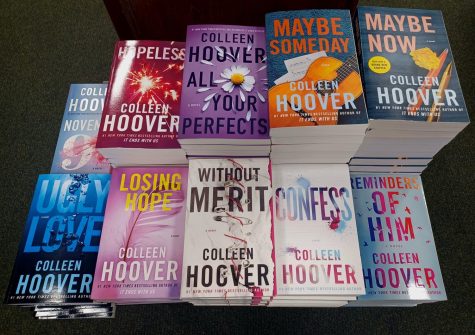
In the article “Cancel Colleen” by Kelly Schwint, she states, “Hoover uses violence for its shock value, rather than addressing it with any real substance. Not only does this invalidate people’s experiences, but it belittles them too.”
Commenting on “It Ends With Us,” COMPASS senior Eliz Barsikhian said, “Everything was so outdated and you can tell it was an older adult trying to write about how young adults actually act. Also what was really frustrating is that Lily, the main character, didn’t even heal after the abusive relationship and she just jumped into another one. There is nothing realistic about her healing process and her abuser didn’t even take accountability for his actions.”
Despite all of this information, Colleen Hoover is not listed in the American Library Association’s yearly top 10 most challenged books list. While Hoover’s novels are controversial, they are not considered sensitive by the opinions of various librarians. Therefore, her stories are not censored and can be available for selection in school libraries.
Ms. Hayes, Millikan’s librarian, confirmed that our school does not carry any of Hoover’s novels. She suggested that it can be solely due to the district’s selective process of choosing books based on merit.

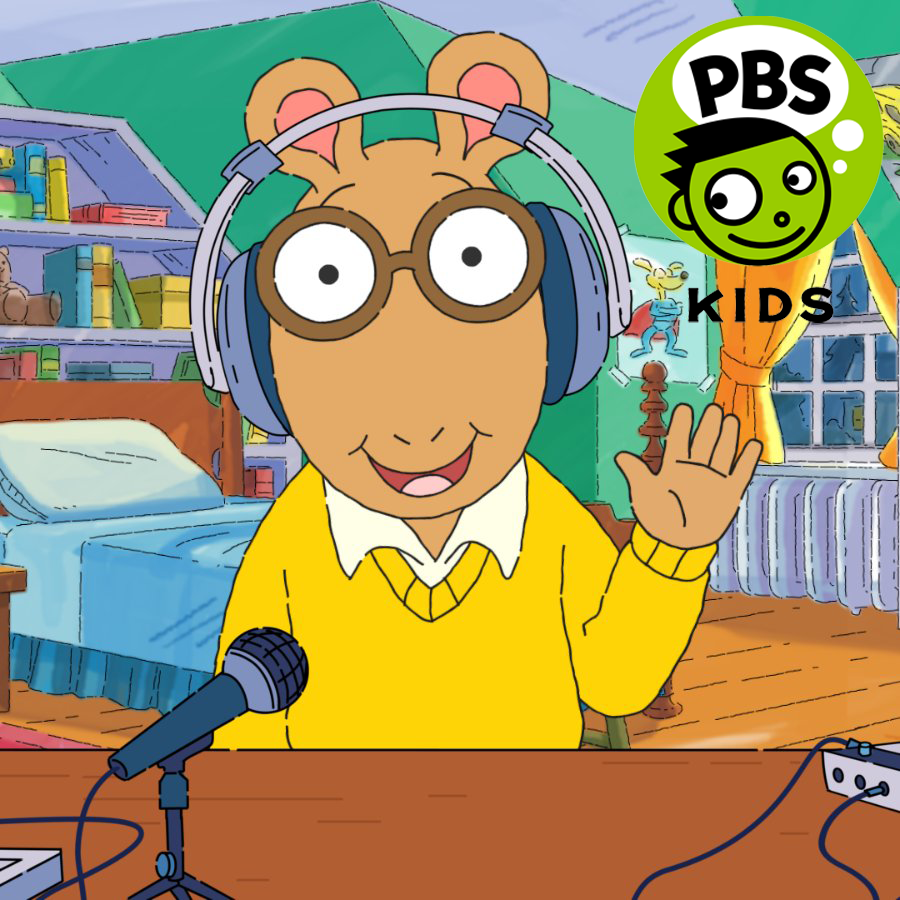


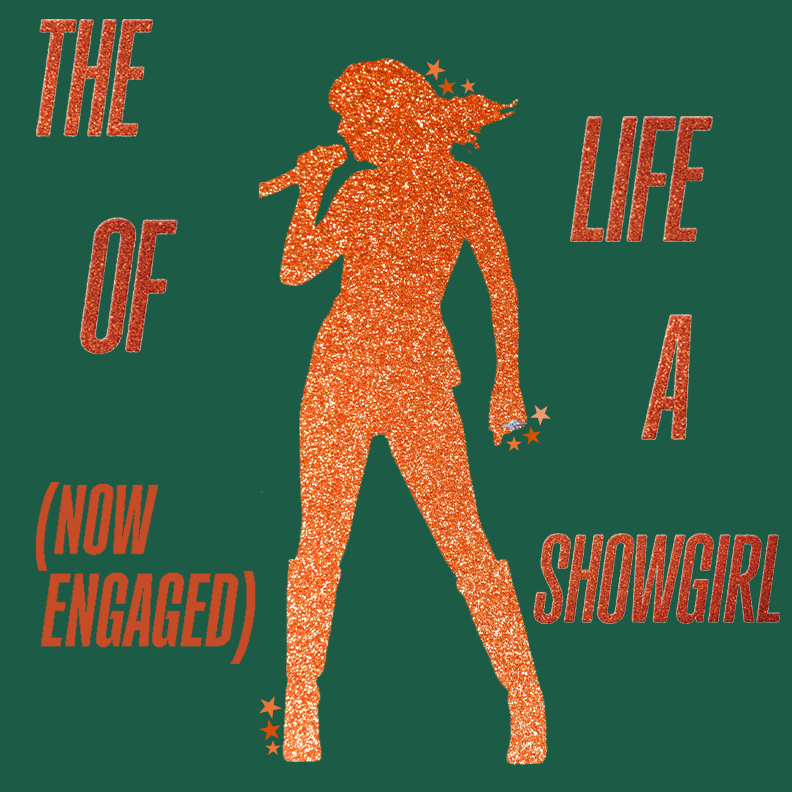



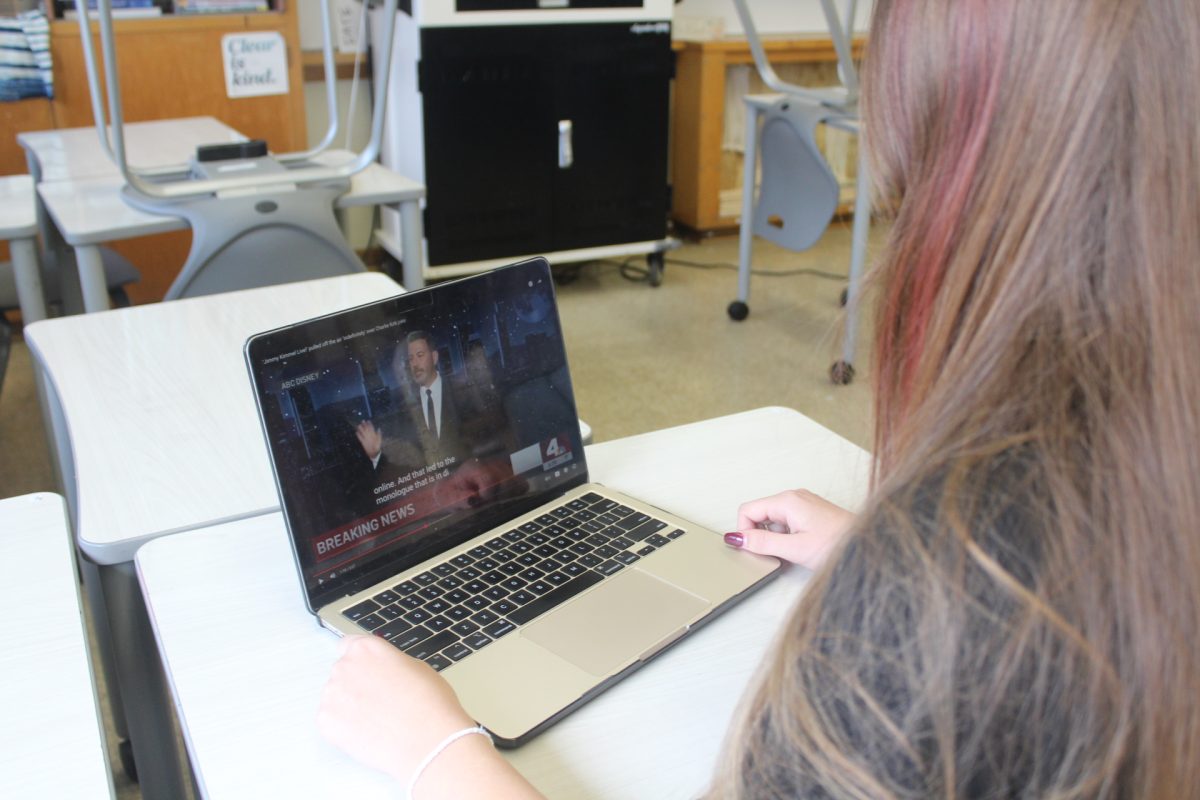
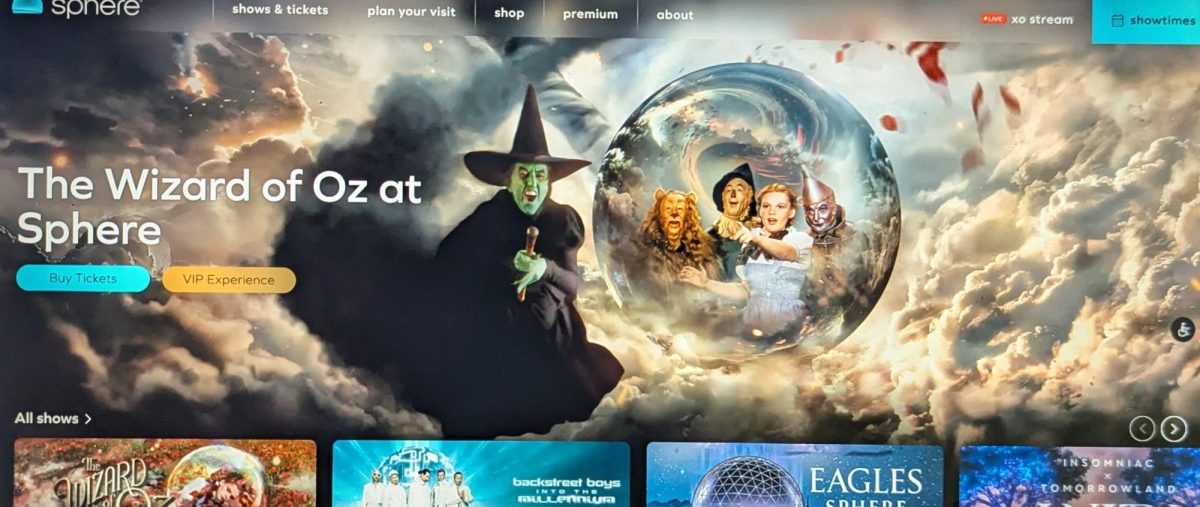

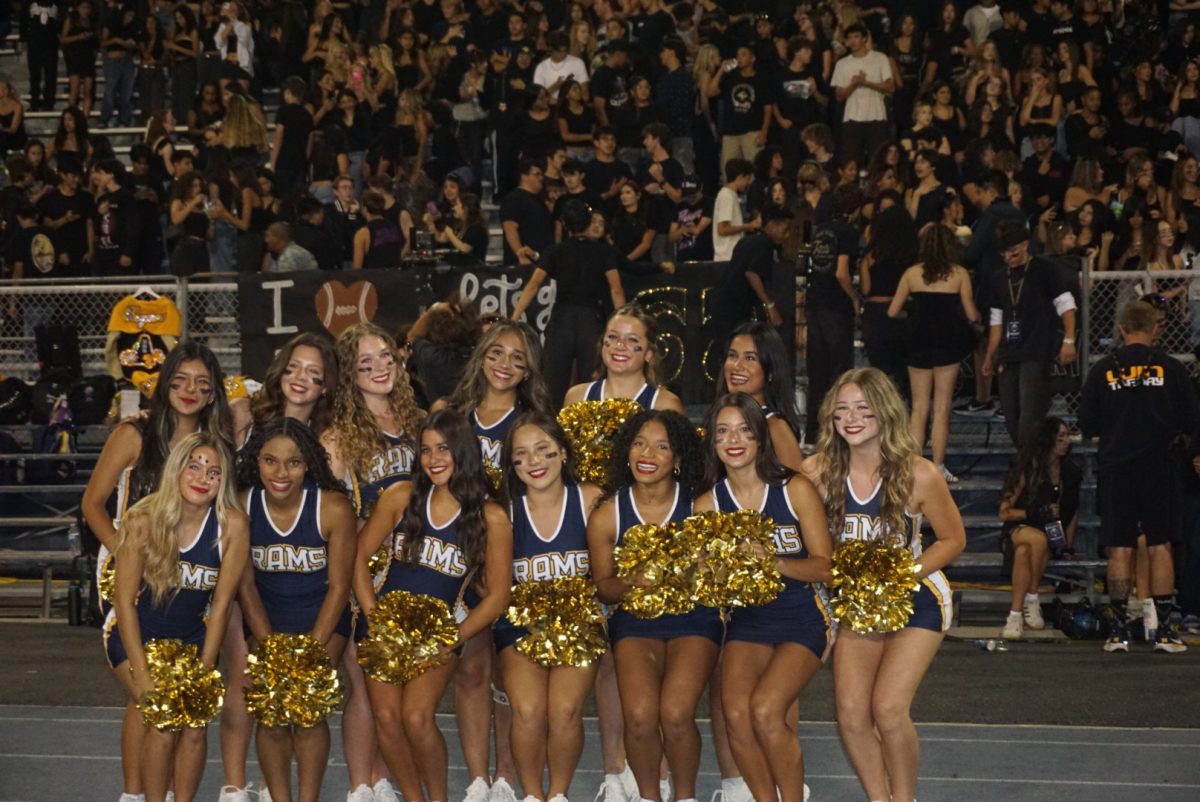






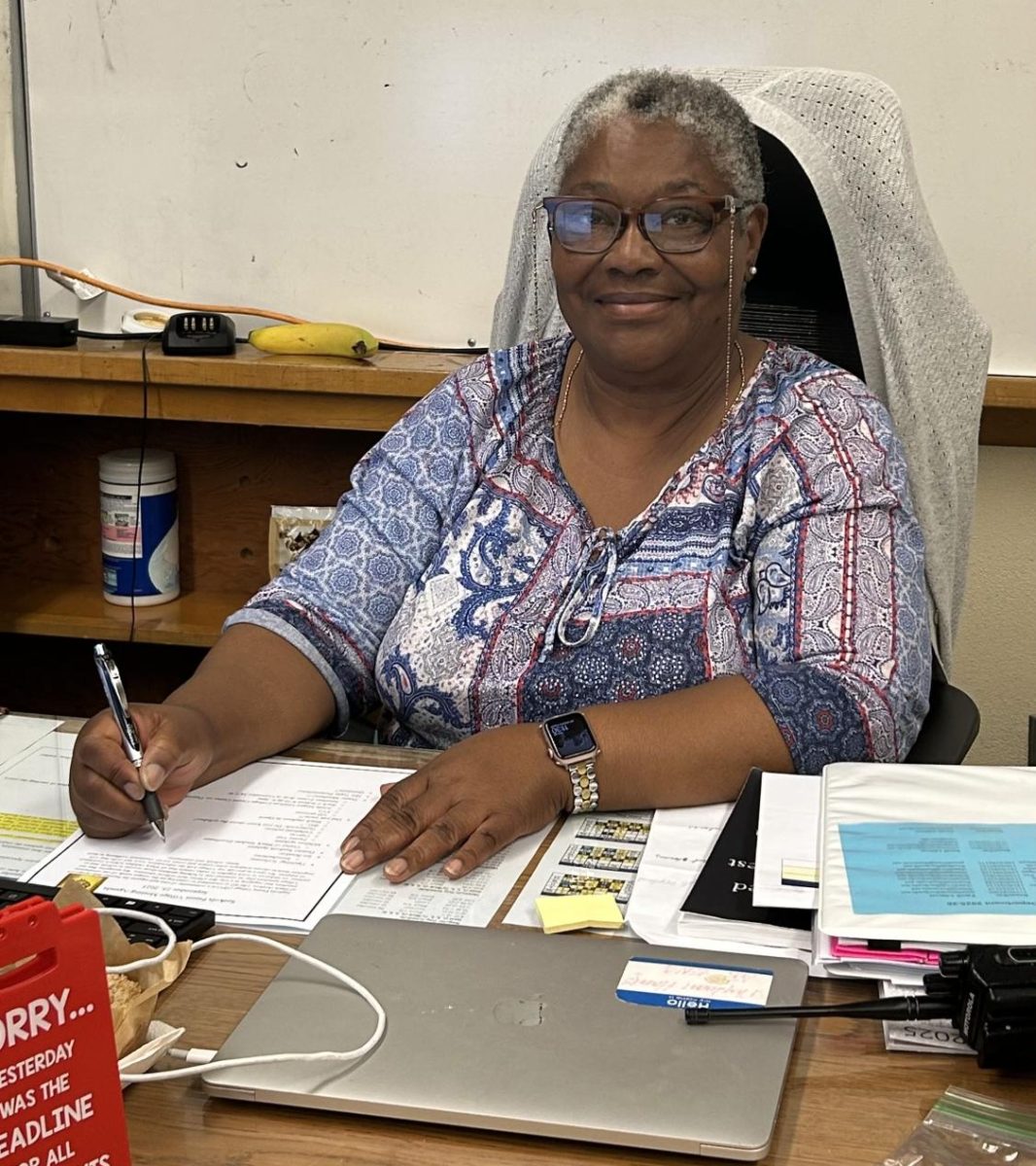

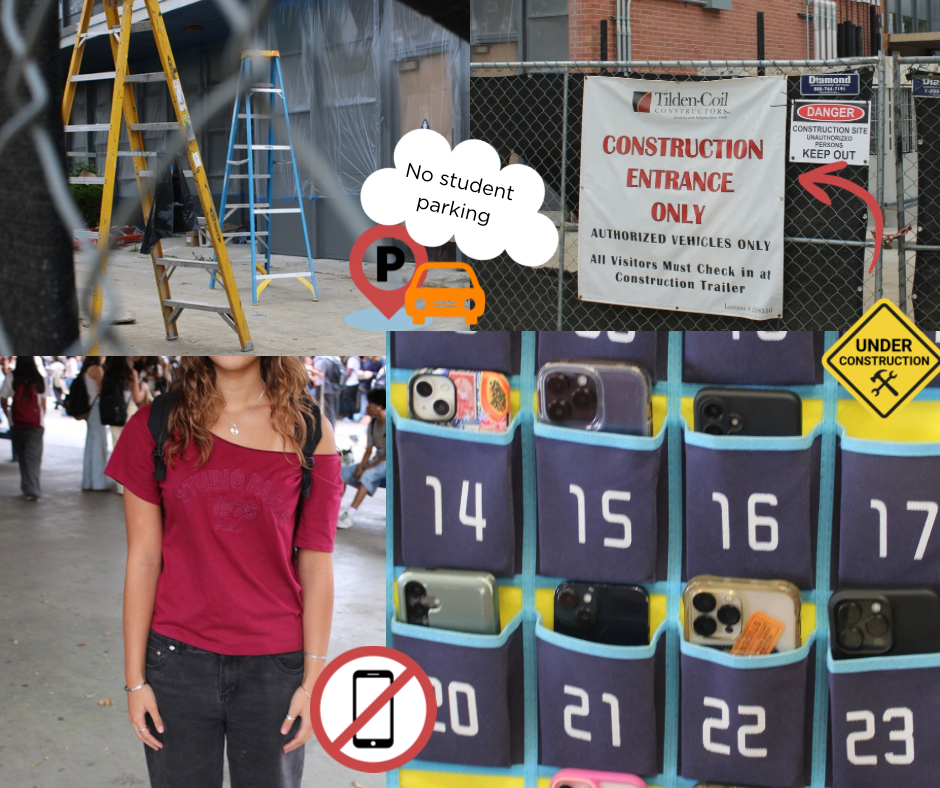

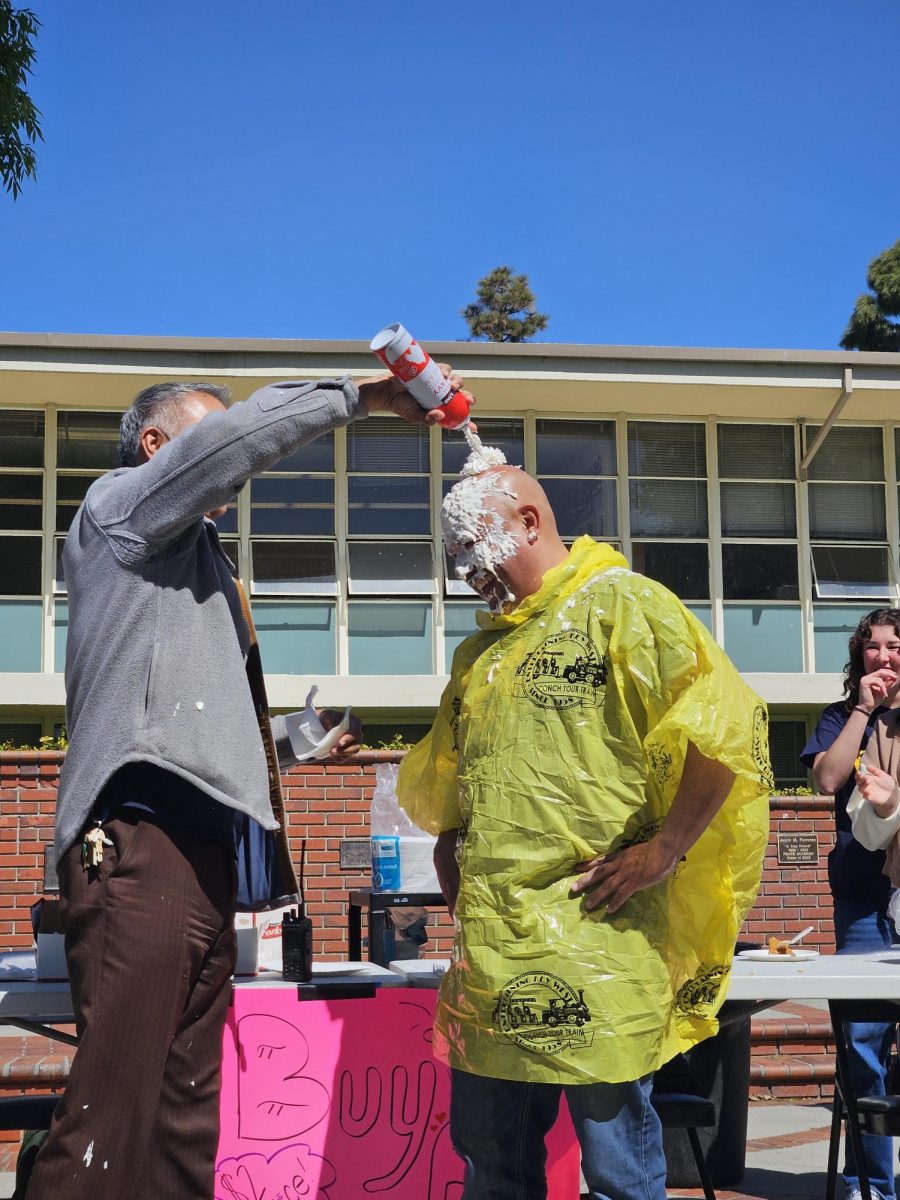


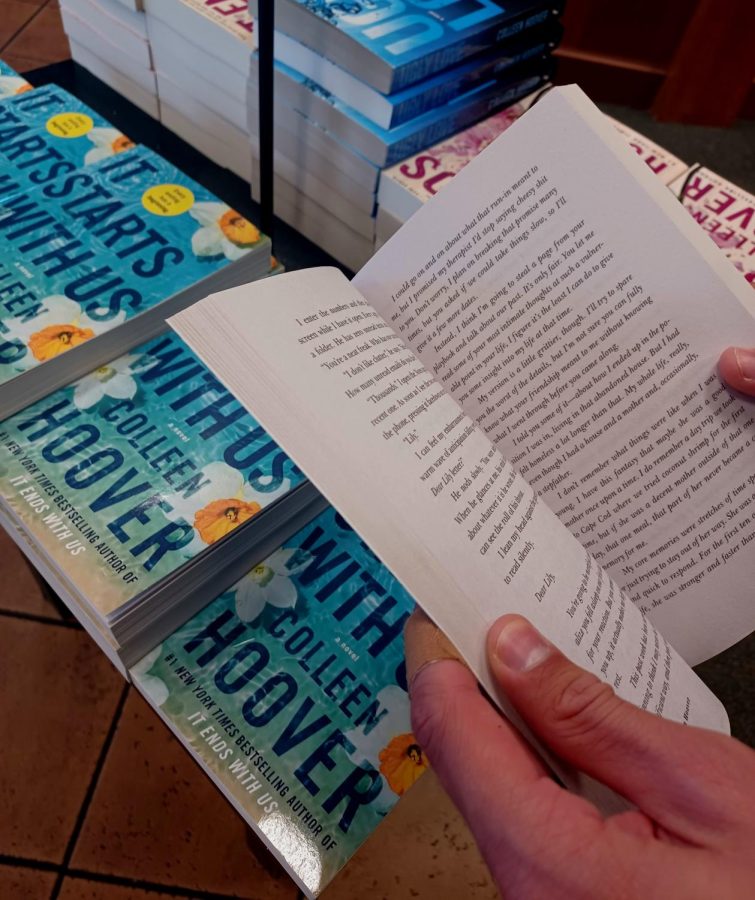






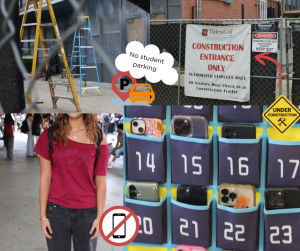

Emilia Flores • Mar 1, 2023 at 10:40 am
On January 11, Kassie Sainz wrote an article titled “Commend or Cancel Colleen Hoover.” This article talks about the rising controversy centralized on Colleen Hoover, an American New York times bestseller author who primarily writes romance novels targeted for adults/young adults. Sainz evaluates Colleen’s three most acclaimed novels: “Ugly Love”, “It Ends With Us,” and “November 9.” She describes these novels as “cheesy” and “unrealistic” while they also exert unnecessary and sensitive themes of sexual assault, toxic masculinity, and borderline abusive relationships. I myself have not read much of any of these novels, but recently purchased “Ugly Love” after being recommended by a friend of mine during a trip to Barnes and Noble. I read a maximum of 40 pages, and can confirm myself that the plot was being steered into an unrealistic, over romanticized situation. I hadn’t reached the sensitive topics that were talked about in Sainz article, so reading about them has brought me caution and helped me avoid reading Colleen’s books in the future. An article written by Naomi Torrs-Mackie on TIME also emphasizes the futility of the dehumanizing sections of Colleen’s books, “when we learn about somebody’s traumatic past, and what they have to fear, that’s all we see. That’s very unfortunate because, of course, trauma survivors are full, multifaceted humans.” Are Colleen’s books going to continue to be widely read by young audiences? Will she ever be held accountable for her unnecessary romanticization? Overall, I’m grateful to have come across Sainz’ article, as it brought awareness to Colleen’s controversial books that are being massly purchased that may bring harm upon young readers.
Melissa Mejia • Feb 2, 2023 at 10:44 am
On December 20, Kassie Sainz wrote an opinion piece called, “Commend or Cancel Colleen Hoover?”. The article discusses the controversial writing style of Colleen Hoover and her infamous books. I have seen a lot of discussion of Hoover’s books online, especially on TikTok, so I was interested in reading the position of this article. Also, I have been interested in reading a piece about another controversial author ever since you wrote about the author Alex Aster in October. Once again, I found this article to be well-written as well as engaging. I was humored by the part where you tell readers about the research you did, “I believe I have read more than enough.” To add to your points about underdeveloped writing, I found it a bit absurd that the main character in “It Ends With Us” is named Lily Blossom Bloom while owning a flower shop. After reading about choices like that, I definitely agree with you about some of her books reading like a first draft. From reading this article, Hoover’s writing seems to be underdeveloped throughout her books. Overall, this article was an interesting read. Thank you for informing me more about this topic.
Natalia • Feb 1, 2023 at 1:09 pm
On December 20, Kassie Sainz wrote an article titled “Commend or Cancel Colleen Hoover?” In the article Sainz evaluates the complexity of three of Hoover’s books, ultimately explaining that they lack professionalism, “reading more like a subpar first draft” and that they fail to represent the lives of the characters beyond the trauma and abuse they suffer. These opinions that Sainz expresses are ones that I agree with because in the novel “It Ends With Us” Hoover uses abuse and homelessness as defining personality traits for her characters and at the end of the book she doesn’t explain how the main character, Lily Bloom, healed from that abuse, making her move on. For reasons like the one aforementioned and because Hoover uses abuse in her books as plot twists there can be desensitization to abuse among her readers, especially being that several of them are young adults that can get wrapped up in the popularity of the book, ignoring that the issues that the characters are facing do happen in real life. These books are considered to be romance books, but this portrayal of romance lacks nuance as the characters continue to seek romantic relationships with abusive partners and continuously make excuses for their abusers. These portrayals of women make them seem subservient even if a character does end up getting out of an abusive relationship in one book another book of her’s will explain a new cycle of abuse.
Catherine Gentry • Feb 1, 2023 at 12:59 pm
On December 20, Kassie Sainz wrote an article titled “Commend or Cancel Colleen Hoover?” The article gives an overview about author Colleen Hoover and the recent issue of her improper use of trauma in a storyline. As someone who has never heard of Colleen Hoover, I was surprised to see how popular her books are and how they are trending on social media platforms like TikTok. After reading the article, I was informed about Hoover’s misuse of trauma, like sexual assault and abusive relationships. There appears to have been an uproar over the author’s usage claiming it dehumanizes the extent to which issues about these topics are harmful and damaging in the long term. Sainz also wrote that Hoover did not include healing nor development following an abusive relationship a main character was in. The article presented that many were upset with Colleen Hoover’s lack of complexity when addressing topics like abuse. Instead of using trauma in the storyline to bring awareness to topics or present character development, Hoover uses trauma as a personality trait. After reading Sainz’s article, Hoover’s books do not appeal to me in any way. I believe it is disrespectful for an author to utilize trauma and abuse as a way to add a shock factor which overall makes these issues seem like a quick issue rather than a lifelong wound. Why do people continue to read her books? Thank you for bringing this issue to my attention.
sophia brown • Feb 1, 2023 at 12:58 pm
On December 20, Kassie Sainz wrote an article titled “Commend or Cancel Colleen Hoover?” The article describes Hoover’s top hits and if they deserve the praise they have received. While Hoover creates dramatic storylines that display abuse, sexual assault, and toxic masculinity, her books end up falling short due to the fact that she uses these very hard subjects as a shock factor instead of creating events more realistic. An anecdote from a student adds that in her book titled, “It Ends With Us” the main character jumped into relationships without healing from a prior abusive one, and her abuser is not held accountable for his actions. I find this very interesting because after reading the book myself, I found this a little annoying and harmful to say the least. The main character was traumatized and she moved on from it in a blink of an eye and this made it seem like she was just disregarding all of the things that happened to her. This is harmful because the situation that Hoover puts the main character in is very real, and treating it like she can just move on to another relationship can dismiss an actual person’s experience.
Angelique Rios • Feb 1, 2023 at 11:25 am
On December 20, 2022, Kassie Sainz wrote an article titled “Commend or Cancel Colleen Hoover?” The article mentions that Colleen Hoover is an author who likes to use trauma as storylines, along with plots that are filled with themes of sexual assault, toxic masculinity, and abusive relationships. Not only does she do that but, she also makes the identities and personalities of her main characters evolve around their trauma. As a person that loves reading romance novels, this makes me sick of how Hoover is making a living off of stories that are full of trauma, therefore, I say we should cancel her. Prior to reading this article and learning more about Hoover, I bought two of her books due to seeing all the praise they were receiving on #booktok. These two books were “It ends with Us” and “It starts with us”, and let me just say that I agree with Sainz when she states “I believe I have read more than enough. The borderline cheesy and unrealistic dialogue in “Ugly Love” instantly veered me away”. Not only does Hoover write these terrible books but, a while ago, it was announced that her son had sexually assaulted someone and then once the victim came out with this assault, Hoover immediately blocked the victim. When she did this it made me even more disgusted with her. I believe we should cancel her to show her that the things she is doing are wrong. I regret buying two of Hoover’s books and giving this author my money but, from this bad purchase, I have now learned not to trust #booktok’s recommendations and decided that in the future, I need to do my research on books.
Lily Palmer • Feb 1, 2023 at 11:04 am
I enjoyed this piece because it affirmed opinions that I share about the content and writing style of Colleen Hoover’s books. Since they are so popular, I often feel that my opinion on them is unusual, but this article served as assurance that I am not alone. I, too, found the dialogue and prose to be awkward, unrealistic, and clearly written by an adult who does not understand the younger demographic. I also felt that through her male protagonists, she normalizes abusive relationships and toxic masculinity. Additionally, her books do not give the abused characters healing or any satisfying self-fulfillment arcs. They do not empower people who have experienced abuse, and I agree with the quote stating that it is mainly used for shock value. I was concerned when I read reviews for “November 9th” informing me that there used to be a sexual assault scene that she removed in later copies due to backlash. I found it even more concerning that so many people loved both the original version and the new version. I appreciated this article for bringing to light many problems with Colleen Hoover’s books.
Gisell Giron • Jan 31, 2023 at 1:49 pm
On December 20th, 2022, Kassie Sainz wrote the article “Commend or Cancel Colleen Hoover?”. This article concentrates on the author Colleen Hoover and whether or not her work deserves all of the praise it is receiving. Sainz dissects famous works of Hoover’s and discovers that most of the characters are 2-Dimensional, and their sole trait is their traumatic background. The author goes on to explain how this can be dehumanizing to people who have actually been through similar situations. It makes me wonder how younger viewers’ perception of trauma is affected by these novels. In an interview with Eliz Barsikhian regarding one of Hoover’s most popular books, “It Ends With Us”, the sense that Hoover uses trauma for shock value is explicitly stated. Further in the interview, the Barsikhian explains that the characters quickly move on from their trauma and don’t get a proper time to heal. The author of the article further explains the impact of Colleen Hoover and her fans through the closing of Z-Library. I know that my family and I were impacted by this as my sisters are in college and often used this website to get their textbooks. The writing style of Colleen Hoover is also scrutinized and I appreciate the honest review of the material itself. Overall, I agree with what the author has to say about this popular author.
Jayden • Jan 31, 2023 at 1:06 pm
Kassie Sainz discusses the controversy surrounding popular romance author Colleen Hoover in her article “Commend or Cancel Colleen Hoover?” published on December 20th, 2022. As someone who loves to read, I’m very familiar with her and her controversy, and as someone with a rampant individuality complex, I’ve avoided her work like the plague. I admire Saniz’s decision to read and review some of Hoover’s books herself, as it shows dedication to the argument and makes me trust her opinion as a reader. Although the article is very well written, this controversy has absolutely no substance. It’s not an author’s job to take care of their readers, or promote realism or healthy characters and relationships. It is fiction, and writing novels about toxic relationships isn’t the same as advocating for them. I’m by no means a Hoover stan, but if the book makes you upset…close it???? Bad literature or poor writing doesn’t validate a ‘cancellation’ of someone’s career. I fully believe that the books aren’t good, but I wonder how much of the criticism is simply due to the endless pattern of Tiktok adoring something and then condemning it ruthlessly after its surge of popularity.
Olivia Lopez • Jan 31, 2023 at 12:55 pm
On December 20, Kassie Sainz wrote an article titled “Commend or Cancel Colleen Hoover?”. The article goes over some of the more problematic points of a few books that Hoover has written. The three books discussed are “It Ends With Us”, “Ugly Love”, and “November 9”. This article also touches on other topics related to Colleen Hoover such as the shut down of the website known as Z-library and BookTok. Overall I appreciated how Sainz gave a comprehensive breakdown of why several of Hoover’s books are considered to be problematic and can be harmful to those who have experienced trauma such as those used to further the plot of her stories. Additionally, I thought that Sainz reading one of Hoover’s books was an invaluable piece of the article as it allowed for further commentary of the storyline of the book as well as the overall writing style. Moreover, the article also gives a good view of Hoover’s books in a more broad context by discussing aspects such as whether or not her books are included in the Millikan High School library and the American Library Associations yearly top 10 most challenged books list. Aspects such as this allows for a more comprehensive understanding on the situation regarding Colleen Hoover as a controversial author. Overall the article was well written and explained the topic very well.
Adora Vinhnee • Jan 31, 2023 at 11:10 am
The article covers the continuous growth of controversy regarding author, Colleen Hoover and the plot of her books. As she rose to fame and made an everlasting appearance on “BookTok,” I have fallen victim to 13 of her books and I can agree with you when you say that “the prose of Ugly Love reads more like a subpar first draft rather than a published novel.” I was particularly intrigued by the title and cover photo because I previously knew of the issues revolving around her books and their theme of trauma and abusive storylines, which Sainz did an excellent job of describing to those who may not know as much about Hoover and who have desire to learn more. The article contains various pieces of evidence to back up the validity of this debate, including a psychologist’s opinion, an actual Colleen Hoover reader, and Millikan librarian. This helped increase intrigue and cause readers to really think about their position on this topic. It made me personally recognize whether or not other author’s I have read books from also do this in their writing. All in all, Sainz’s article on Colleen Hoover was very well written and compelling to read.
Leah Facterman • Jan 31, 2023 at 9:53 am
On December 20, Kassie Sainz wrote an article titled “Commend or Cancel Colleen Hoover”. The article informs us about the controversy surrounding a popular BookTok author, Colleen Hoover. I think this article made a lot of good arguments as to why Colleen Hoover doesn’t deserve the praise she gets and why her books aren’t very good. In addition to mishandling traumatic experiences, like abusive relationships and violence, Colleen Hoover doesn’t have a good writing style. I think it is important to inform people about the media they might buy, especially when a lot of BookTok content creators ignore the issues that Colleen Hoover’s books cause. I agree that authors who use trauma as plot points and don’t properly write about the important issues are not good authors and don’t deserve high praise. I was happy to hear that Millikan doesn’t have any of Hoover’s books. I have never read Hoover’s books but I was considering reading them until I found out how terrible they are. I think it’s very important to spread this information so that others do not waste their time and their money on a book that promotes unhealthy relationships. I also agree that Colleen Hoover’s books should be placed on the challenged book list.
bridget • Jan 31, 2023 at 9:39 am
On December 20, Kassie Saintz wrote an article titled “Commend or Cancel Colleen Hoover?” The article talks about how Hoover’s books are solely based on trauma, and that she uses it as a storyline in all of her books. From my understanding, Hoover’s books are considered sensitive because of the storyline topics such as sexual assault, toxic masculinity, and abusive relationships. It is also mentioned that Hoover uses violence for its shock value. This makes me wonder if that is her true intent, and if she is aware of what she’s doing. I also wonder if this realization has made people who were once fans change their personal opinions of her. I have read one of her books, and I can understand how it appears to be a trauma dump. I also agree with how she uses violence for shock rather than addressing it, and how that can invalidate people’s experiences. Coalition also states,” When trauma is absolutely central to a character’s existence, it can be dehumanizing and parallel what happens in real life- when we learn about somebody’s traumatic past, and what they have to fear, that’s all we see. That’s very unfortunate because, of course, trauma survivors are full, multifaceted humans.” I think it’s important that this is brought up to the public, thank you for making it known.
Audrey Rodgers • Jan 31, 2023 at 9:22 am
On December 20, Kassie Sainz wrote an article titled “Commend or Cancel Colleen Hoover?”. The article talks about a popular author and how her books shouldn’t be as popular as they are. I’ve read plenty of Colleen Hoover’s books hoping I would eventually find one that I loved. Let’s just say that didn’t happen. Some of Hoover’s books have important themes in them, but she utilizes them in the wrong way. In “It Ends With Us”, Colleen Hoover uses an abusive relationship just to add shock value and make the plot more interesting. But, she never really goes in depth about how serious this type of relationship can be. In fact, she partially ignores it by having the main character (who was abused) jump into a new relationship almost immediately after the abusive one ended. I completely agree with you when you said that the characters’ personalities in Hoover’s books revolve solely around their trauma. I also agree with Eliz Barsikhian’s statement about how nothing is realistic in Colleen Hoover’s books. Some might say that these books are fiction and don’t need to be realistic. I think that when writing a book on a serious situation that has a sense of realism, it needs to be as realistic as possible. And that’s definitely not what Colleen Hoover does with her books. I was wondering if you had heard about the coloring book Colleen Hoover announced that would be based on “It Ends With Us”. She received so much backlash that she canceled its release very soon after she announced it. Personally, I think a coloring book based on a novel with serious situations in it is completely unacceptable. Anyways, I loved this article and I thought it was very well written! I hope more people recognize that Colleen Hoover’s books aren’t as amazing as some people say they are.